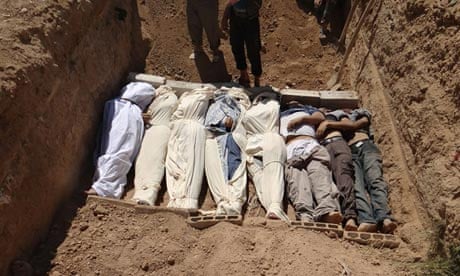Syrian state media says the government has reached an agreement with the United Nations to allow a UN team of experts to visit the site of last week's alleged chemical weapons attack.
State TV also said in a statement on Sunday that the two sides were working to set a date and time for the visit to the agreed upon locations outside Damascus purportedly hit by chemical agents last week.
The UN said that a team of experts already in Syria "is preparing to conduct on-site fact-finding activities'" on Monday, UN spokesman Martin Nesirky said in a statement.
A senior US official said that there was "very little doubt" a chemical weapon had been used by the Syrian regime, but added that any decision to open the site to UN inspectors was "too late to be credible".
"At this juncture, any belated decision by the regime to grant access to the UN team would be considered too late to be credible, including because the evidence available has been significantly corrupted as a result of the regime's persistent shelling and other intentional actions over the last five days," the official told Reuters.
Scientists who specialise in neurotoxins, such as Sarin, say its potency quickly dissipates about 30 minutes after exposure. Sarin is increasingly difficult to detect up until around one week after exposure, after which sampling is considered unviable.
It is now nearly five days since the attack in Damascus in the early hours of Wednesday.
The apparent move by the Syrian regime came as the UK prime minister, David Cameron, and President Barack Obama moved the west closer to military intervention on Saturday as they agreed that last week's alleged chemical weapon attacks had taken the crisis into a new phase that merited a "serious response".
In a 40-minute phone call , the two leaders are understood to have concluded that the regime of Bashar al-Assad was almost certainly responsible for the assault that is believed to have killed as many as 1,400 people in Damascus. Cameron was speaking from his holiday in Cornwall.
The prime minister and US president said time was running out for Assad to allow UN weapons inspectors into the areas where the attack took place.
Government sources said the two leaders agreed that all options should be kept open, both to end the suffering of the Syrian people and to make clear that the west could not stand by as chemical weapons were used on innocent civilians.
A spokesman for No 10 said: "The prime minister and President Obama are both gravely concerned by the attack that took place in Damascus on Wednesday and the increasing signs that this was a significant chemical weapons attack carried out by the Syrian regime against its own people.
"The UN security council had called for immediate access for UN investigators on the ground in Damascus. The fact that President Assad had failed to co-operate with the UN was being seen as suggesting that the regime has something to hide.
"They reiterated that significant use of chemical weapons would merit a serious response from the international community and both have tasked officials to examine all the options. They agreed that it is vital that the world upholds the prohibition on the use of chemical weapons and deters further outrages. They agreed to keep in close contact on the issue."
The French president François Hollande said there was "a stack of evidence" suggesting there had been an "attack of a chemical nature" in Syria. He added that "everything leads us to think" the Syrian regime is responsible.
In a statement released on Sunday Hollande said that France was determined "not to let this act go unpunished". He called on the Syrian government to give "total and immediate cooperation" to the United Nations' weapons inspectors "so they have immediate and unrestricted access to the areas concerned by the chemical attacks".
The Elysée Palace said the French president had spoken to the Australian prime minister Kevin Rudd (Australia will take over the presidency of the United Nations security council next month).
Russia warned that it would be a "tragic mistake" to assign blame for the alleged chemical weapon attack too soon.
"We strongly urge those who by trying to impose their opinion on UN experts ahead of the results of an investigation ... to exercise discretion and not make tragic mistakes," the Russian foreign ministry said in a statement on Sunday.
The dramatic raising of the stakes came after the international medical charity Médecins sans Frontières (MSF) reported on Saturday that three hospitals in Damascus had received approximately 3,600 patients displaying neurotoxic symptoms in less than three hours on the morning of 21 August. Of those patients, 355 are reported to have died.
Dr Bart Janssens, MSF's director of operations, said: "Medical staff working in these facilities provided detailed information to MSF doctors regarding large numbers of patients arriving with symptoms including convulsions, excess saliva, pinpoint pupils, blurred vision and respiratory distress."
He said the reported symptoms strongly indicated "mass exposure to a neurotoxic agent. This would constitute a violation of international humanitarian law, which absolutely prohibits the use of chemical and biological weapons."
The UK foreign secretary, William Hague, said last week that "this is a chemical attack by the Assad regime" and "not something that a humane or civilised world can ignore".
Obama has been reluctant to commit American forces to what has become a bitter and protracted civil war. However, he said last year that use of chemical weapons would cross a "red line" triggering a more robust US response. It was confirmed that the US navy is deploying an extra missile warship to the eastern Mediterranean ahead of a summit to debate the massacre.

Comments (…)
Sign in or create your Guardian account to join the discussion